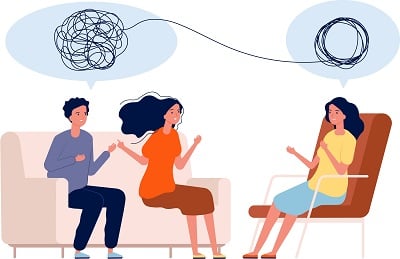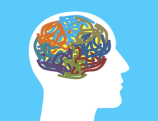Rethinking "Mental" Health
Rethinking "Mental" Health

Let’s honor May's Mental Health Awareness Month with a truth bomb: our approach to mental health is broken. I say that as a clinical psychologist who has been in practice since 2007.
Inadequate mental healthcare isn't a new thing. I've said for eons that we need to teach basic psychological education and skills starting in kindergarten. The difference now is that COVID shined a giant spotlight on just how not ok things are, and people are willing to have conversations now.
I'll take it.
The Gaps in Mental Healthcare
I see two fundamental problems with our current approach to mental health. One is our system for providing care and intervention. The other is our society’s view of mental health in general. These are certainly intertwined, and both need to change.
The Current Mental Healthcare System
Consider, for a moment, what our system for physical healthcare looks like. We have public health campaigns and curricula in school to teach the fundamentals of nutrition and the importance of exercise. Vaccinations are commonplace practice during childhood as are well-child visits to the pediatrician. As adults, we have routine physicals and screenings to make sure we’re catching health concerns early. We have wellness programs at work to entice us to eat well and move, maintain a healthy weight, and refrain from health zapping behaviors like smoking. This is all to try to limit injury and diseases and protect our health.
That said, inevitably, despite our best efforts, illness and injury do happen. Then what? We can go to primary care doctors or urgent care facilities. If we need more, we see a specialist. And, if we’re in crisis, we have the emergency room, which is really intended as an immediate intervention in dire cases and is not designed to be the main feature of our healthcare system.
Now contrast that with our approach to mental health. Historically, we have focused on intervening only when things have already gone very awry, when symptoms are causing significant impairment in functioning. We’re left scrambling, trying to get help. I’d argue that when it comes to mental health, we basically have an ER model…and that is just not good enough.
Our View of Mental Health
Until recently, societal conversations about mental health have treated the topic like it is something that is only relevant for those suffering from a diagnosable mental illness rather than as something that applies to EVERYONE, regardless of how good or poor their mental health is at that moment.
Even as a field, we have disproportionately focused efforts on studying and addressing the things that go “wrong” with us as humans, with the goal of restoring us to baseline. That’s important, for sure, but is also the equivalent of medicine only focusing on treating heart disease AFTER a heart attack has occurred rather than trying to prevent it in the first place. It’s high time we focused on helping people proactively optimize their mental health to buffer against stressors and adversity that may, otherwise, tank our psychological well-being.
The Shift
What would it be like if we approached mental health the same way we do physical health? If we normalized it. Everyone – every single human being with a human brain – needs to focus on psychological well-being. No one bats an eye when someone says they're joining a gym or working on their fitness. In fact, we cheer them on. We view it as a positive thing, not a sign of weakness or failure or flaw. Let’s do the same thing with psychological strength. Let’s intentionally focus on building it and encouraging others to do the same. Our brains are amazingly plastic (meaning they can change), and we can do a lot to train healthy mental habits that can promote resilience and reduce mental illness. Understanding how our minds work and their natural tendencies could help reduce suffering related to mental illness.
An Ounce of Prevention Is Worth a Pound of Cure
When it comes to physical health, we're taught to eat leafy greens and limit junk food. We're taught that our bodies need cardio and strength training and stretching and good sleep. We're taught to recognize and watch out for early signs of heart attack and stroke.
In other words, we spend a lot of time and resources on prevention, trying to halt problems before they escalate.
We don't do the same thing when it comes to mental health.
We know that some lifestyle factors contribute to anxiety and depression. For example, effective stress management, adequate sleep, and regular exercise are foundational practices for managing mood and anxiety. We also know that there are some general psychological principles and skills that can help protect against or reduce anxiety and depression (like mindfulness, self-compassion, and psychological flexibility). Yet, where are the public education campaigns, school courses, employee wellness programs, and daily conversations focused on basic brain science and psychological well-being? How amazing would it be if everyone had a foundational knowledge of how their minds worked and how to properly care for them?
Rethinking Mental Health to Reduce Stigma
If I'm being completely open and honest with you, I don't even like the term "mental health." To me, it separates out mental health as something different, something other, and that perpetuates stigma. Instead, we need to talk about health in a comprehensive way that includes mind AND body. The distinction between them truly is arbitrary. (For example, for a sizable chunk of people, depression is actually the result of inflammation in the body; a mindfulness practice has empirically been shown to affect biological responses; chronic stress raises your risk for cardiovascular disease). If there's a line between mental and physical health, it is blurry at best. To act as though mental health and physical health are somehow fundamentally different is not only inaccurate but also incredibly problematic.
We don't hesitate to go to the doctor when we break a foot or have allergies, but we get squeamish about seeking help for anxiety or depression. We somehow look at those latter experiences as a sign that something is wrong with us, that we are flawed in some way. The reality is that we are just human, and human beings have human brains that aren't designed to thrive in our modern worlds.
When left to their own devices, our minds tend to focus on the negative (we naturally notice and remember negative stuff significantly faster than positive stuff, skewing our life experience). Our minds have a propensity toward worry and rumination and, if left unchecked, these habits up the chances of developing anxiety and depression.
Our modern worlds set us to be sleep-deprived, spend too much time indoors being sedentary and on screens, and feel isolated. We don’t live in tight-knit supportive communities anymore. Unfortunately, that social disconnection (not to mention social distancing) takes a very real toll on our nervous systems and psyches. Work and life demands contribute to chronic, poorly managed stress, which is not a state we are designed to be in long-term. Social media breeds unfair comparisons that leave us feeling inadequate, fosters FOMO and feelings of loneliness, and leads to hours of mindless scrolling. Altogether, our modern lives bring out the worst in our brains…unless we are intentional about pursuing psychological well-being.
Now when we take the pitfalls of our modern world and our minds’ natural propensity toward negativity and add all of the adversity and massive challenges of the past couple of years, it’s no wonder that rates of anxiety and depressive disorders are skyrocketing. These health conditions were prevalent before but are now increasing at alarming rates. What does that tell us? That we’re human and we need help.
Of course, we do! If you are one of the MANY people experiencing depression or anxiety, know that it’s ok – no, make that completely necessary – to get help. Watch webinars and read books. The more you know and understand about psychological health, the better. Share your struggles with loved ones or in support groups. Find a therapist or talk with your doctor about medication. Treat anxiety and depression just like you would that broken foot. Get it treated now.
A Call to Action
I implore you to shift your thinking when it comes to mental health. We need to consider prevention and optimization, just like we do with our bodies. And, if you're already on board with that view, fantastic! Let's continue the conversations that mental health IS health. Let's crush stigma, and let's get creative about ways to prevent and provide early, effective intervention for mental health difficulties.
It's way past time that we got serious about optimizing our mental health. It's time that we dedicate resources and efforts to building psychological strength and implementing lifestyle habits and practices that support mental health and psychological well-being.
Dr. Ashley Smith is a licensed clinical psychologist and co-founder of Peak Mind: The Center for Psychological Strength.
The content, view and opinions published in Blogs written by our personnel or contributors – or from links or posts on the Website from other sources - belong solely to their respective authors and do not necessarily reflect the views of ADAA, its members, management or employees.
















